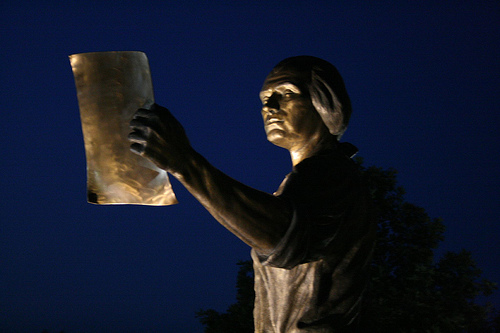So I've finished Peter Beinart's
"The Icarus Syndrome: A History of American Hubris." It's part of a series of books that have been released in the last year or so --
many of
which I've
read (this, apparently, being the year
George Kennan) -- examining American foreign policy in the 20th century. Some of those books have merely had the goal of appraising the Cold War now that it is firmly in history's mirror; others, like Beinart's, are looking back to see what lessons we might learn to apply in the aftermath of America's post-9/11 irrational exuberance for foreign adventurism.
If I could construct my takeaway from all these books -- including Beinart's -- I'd come up with something like this:
* It's insanity for America to think it can be the world's dominant power. A superpower, yes, and perhaps the most powerful one. But the only one? No.
We can't afford it. And other nations -- particularly, at this moment, China -- have a vote.
* We tend to believe in our collective good intentions when we go abroad. The people abroad who feel the pressure of our projected power may be less convinced; we need to do a better job contemplating how they'll see our actions.
* America is best served when its military is just one tool in the foreign policy toolbox. We cannot eliminate every adversary upon the planet; we can contain them, use economic carrots and sticks to pressure them, even throw some money at democratic movements in those countries. Otherwise, we should only pull our sword from its scabbard in response to attack or actual imminent threat. A rival country (say, Iran) that obtains nuclear weapons is cause for alarm but is not, on its own, an imminent threat.
* Accordingly, America might be best served if it pulled back from the goal of being able to project power anywhere on the planet and refocused its resources -- in terms of money and national spirit -- on rebuilding our economy and strengthening our democratic institutions.
I am very interested, after all this, in S
teven Hayward's critique of Beinart's book. I've
chatted with Hayward and like him, but his review of Beinart strikes me as a not-very-elegant attempt to change the subject. Where Beinart makes the case that America has been badly served by ill-fated attempts to remake other countries and regions to suit our country's likes, Hayward's response is, essentially:
But ObamaCare!
His criticisms of pure reason and of naïve faith in human nature's goodness and plasticity questions, implicitly, modern liberalism's central pillar. The eclipse of prudence by scientific, idealistic politics was a defining feature of Progressive statecraft, and it remains so for modern liberalism today—at least on the domestic scene. In making an elegant call for greater circumspection about government's mastery over all things, Beinart's skepticism stops at the water's edge. Why not apply the lessons of hubris—of overreaching and presuming a greater command of flawed human nature than is realistically possible—to, say, health care reform, or social policy generally?
Hayward persists in this mode, wondering why Beinart doesn't spend more time in his book writing about the domestic overreach of liberal government programs. The easy answer to this is:
Because it's a book about foreign policy. But Hayward seems to acknowledge that the United States has often overreached its foreign policy -- though Iraq is doing better than we once thought; he doesn't offer a counterargument to Beinart's thesis, and spends enough time reflecting on the Vietnam War to kind of confirm it. Pinning the problem of overreach mostly on liberals, then, requires bringing domestic politics into the picture.
Fine. But it thus becomes worth asking Hayward's fellow conservatives a similar question: If you doubt government's ability to make society better at home, why would you think it would work beyond our borders, in places with unfamiliar cultures and languages we don't really speak? Hayward writes of Beinart's "blind spot," but Beinart isn't the only person who has one.
UPDATE: A conservative friend of mine, a friend of Mr. Hayward's, writes with the following critique.
By and large, Steve Hayward's conservative friends (esp. of the Claremont variety) never suggested that we COULD spread happiness abroad. Our critique of Bush sort of boiled down to a kind of over-exuberant, childlike faith he has in human goodness.
Fair point! I was trying to be precise by not specifically attributing such beliefs to Hayward himself, but I ended up being a different kind of sloppy. My apologies to him.
To be more precise, though, I'll note that Mr. Hayward is part of a broader conservative movement that, for all its variety,
did help put Mr. Bush in office and that, to outsiders at least, seems remarkably able to unite behind particular politicians and agendas. There are a few conservatives -- of the seemingly influential Bill Kristol variety -- who
do urge restraint at home and adventurism abroad. Hayward critiques liberalism's lack of domestic restraint while countering Beinart; if that's the angle he wants to take, then a more overt critique of his more adventurous fellow conservatives (if, indeed, he believes that) would probably be in order.







